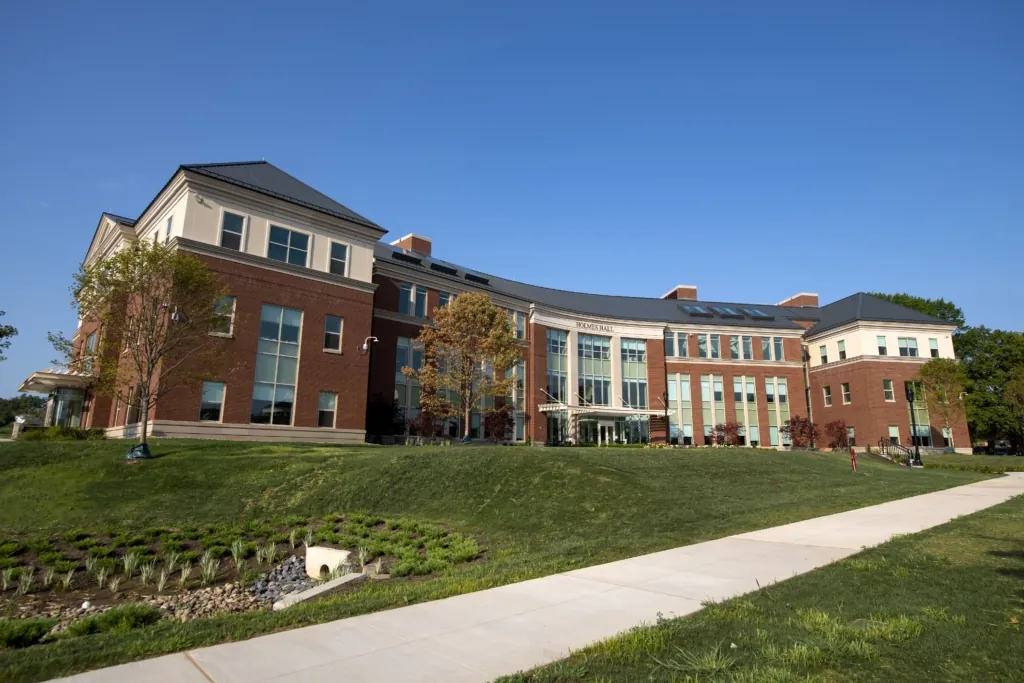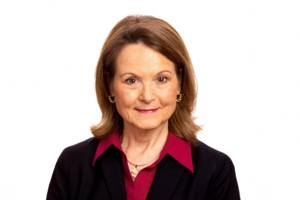
Holmes Hall at the Kenneth W. Freeman College of Management at Bucknell University.
Bucknell University Freeman College of Management
Officials at the Kenneth W. Freeman College of Management like to think of it as a century old startup. Though the college itself only officially formed in 2017, Bucknell University has had management education for more than 100 years.
On July 1, Freeman officially marked its fifth anniversary, evolving from a department at Bucknell University, to a school, and now to a full-fledged college. It has doubled the size of its faculty while enrollments have jumped from about 90 freshmen at the start of the academic year to close to 200 last fall.
Its outcomes are also on the rise. It placed No. 19 in our 2023 ranking of the best undergraduate business programs after ranking No. 17 the two previous years. This is a large surge from 2020’s ranking of No. 35.
As for career outcomes, 97.7% of the Class of 2022 secured full-time employment within three months of graduation at an average starting salary of $78,079 – up nearly $10,000 Class of 2021’s average starting salary of $68,283. Further, 89% of this year’s class landed a business-focused internship before graduating compared to 81% of the previous class. And, as a relatively new, small, rural school not located in a coastal urban center, Freeman is placing undergrads in companies that typically recruit from bigger, more storied universities: McKinsey, Goldman Sachs, and PwC.
LIBERAL ARTS CORE

Holmes Hall at Bucknell University.
Bucknell University, a private university in Lewisburg, Pennsylvania, describes its three academic pillars – Arts & Science, Engineering, and Management – as “three colleges, one Bucknell,” and it ingrains an interdisciplinary approach grounded in liberal arts across all of them.
The college offers seven majors, including a new program in business analytics, along with two minors, including the debut of a minor in real estate. Each FMOC student is empowered to create their own paths of study, typically graduating with more than half of their classes taken from the other Bucknell colleges.
“Unlike many other business colleges, FCOM allows me to complement my major with liberal arts classes. I believe this well-rounded education equips me to utilize a multi-dimensional approach to problem-solving and to think on a deeper level, which will ultimately prepare me to thrive beyond Bucknell,” Lauren Rader, a Freeman senior, told us in this 2022 article.
In fall 2021, Freeman opened the new Holmes Hall, a state-of-the-art facility it shares with the department of art and art history. In any given semester, 15 different departments are teaching in the building. The whole third floor is a creativity and innovation hub with maker spaces, an architectural studio, a dark room, and a virtual reality lab. On Friday nights, the Bucknell football team watches their game films in an auditorium there, and management faculty offices are in proximity to the literary arts faculty.
“It’s had an immediate impact for better collaboration between the two disciplines. It’s really a confluence, like two streams coming together, instead of an intersection where accidents happen,” says Steve Holmes, the building’s namesake, chairman of Wyndham Hotels & Resorts/ Wyndham Worldwide, and 1979 accounting alum “It’s what it should have been all along.”
P&Q INTERVIEW WITH CINDY GUTHRIE
Cindy Guthrie, interim dean of Bucknell University’s Freeman College of Management, took the time to tell us about Freeman’s recent innovations and program differentiators. That interview is presented below.
What are recent and upcoming program developments and innovations that will enhance the experience of future students?
Our most obvious innovation continues to be the 79,500-square-foot Holmes Hall, Bucknell’s new home for the Freeman College of Management, which opened in fall 2021 and is filled with modern, technology-rich spaces where students explore, collaborate and innovate together.
Business analytics and management & organizations are the two newest majors among the college’s five majors, which prepare students to succeed in changing business landscapes through a mix of traditional and leading-edge business administration majors.

Cindy Gutherie, interim dean
Business analytics will prepare students to transform data into insights that organizations need to chart their futures. Working closely with our faculty, students grapple with real problems, ensuring that they learn how to not only be able to process data and develop models, but also with leadership, communication and decision-making skills employers value. They will also explore broader ethical issues related to data collection and analysis, graduating prepared for jobs in industries from sports to health care to marketing.
Management & organizations prepares students to understand and lead organizations with a wide range of missions and purposes. They can choose to focus their major in one or four concentrations — entrepreneurship, global management, human resource management or managing for sustainability — or carve their own way by choosing management courses that prepare them to achieve their goals and aspirations.
We have also launched a number of minors in recent years that are open to all students at Bucknell, underlining our belief that the management, analytical and leadership skills we teach benefit students regardless of their major, field of interest or intended career path. For the 2023-24 academic year we will add minor options in accounting, business analytics, entrepreneurship and human resource management, which joins the existing minor in real estate and general management minor for students outside the Freeman College.
What are your program’s two biggest differentiators from other top undergraduate business programs? How do these prepare students for their careers?
The fact that we are a college of management as opposed to a college of business certainly differentiates us from most undergraduate business programs. At the Freeman College of Management, the knowledge and skills we teach students lead them to employment across a wide variety of professions and sectors. Our graduates go into the world with skill sets and mindsets to make a difference and to create the world they want to live in.

We provide our students hands-on experience from their first year, starting with our signature Management 101 course, which empowers students to create their own companies while simultaneously managing a service project, with all profits from the company’s products invested in the project. This popular, innovative course has been replicated by more than 20 colleges and universities around the world. Real-world experiences continue to infuse the curriculum throughout all four years and include opportunities for experiential learning in cities around the U.S. and the globe, mentorship from alumni at the world’s largest, most important accounting, investment and consulting firms, and the chance to manage a more than $2 million portion of Bucknell University’s endowment through the college’s Student Managed Investment Fund course.
Our commitment to the United Nations’ Principles for Responsible Management Education (PRME) also distinguishes the college from other business schools, especially since it is one of only two U.S. schools to have Champion status. The mission of this group is to contribute to thought and action leadership on responsible management education in the context of the U.N.’s sustainable development agenda. The selection process is competitive and international. Our recognition as a PRME Champion school means that we are viewed as a leader among PRME signatories committed to the Sustainable Development Goals (SDGs) in our education of students.
The Freeman College’s strategic plan, adopted at the end of the 2017-18 academic year, states that we will embed the 17 Sustainable Development Goals in the curriculum of the College. Addressing the SDGs requires management and organizational approaches that incorporate values-driven logics.
What separates your graduates from other business school graduates?
Once again, we think it’s their ability to apply their management education across a wide variety of professions and sectors. Our setting within a larger liberal arts university also affords students opportunities to experience a more rounded curriculum, to interact with others from a wide variety of backgrounds and with a wide variety of interests, and to become adept communicators in both writing and verbal presentation. Our graduates are valued not only for their analytical and technical skills but for their ability to thrive within the world of work.
Explain the career services, programming, and extracurriculars that give your students an advantage in career outcomes?
The Freeman College of Management affords students a number of networking opportunities with alumni and potential employers throughout their undergraduate careers — here on campus and in major cities around the world.

Our alumni mentoring program partners first-year students with experienced mentors at companies including Goldman Sachs, JPMorgan Chase, Accenture and Deloitte. These relationships help them plan for their future and give them insider access to these top global firms, which have a long tradition of employing Bucknell graduates. Students and alumni can also network at Freeman Week and our Business Trends Summit, which connect students with CEOs, partners and industry leaders from across fields.
Alumni and students participate in a number of advisory boards at the Freeman College of Management. These advisory boards help shape the strategic direction of the college and identify and facilitate new opportunities that benefit Bucknell students. Our various college-sponsored speaker series also bring business innovators from Bucknell’s powerful professional network to campus to speak — helping students build a professional network of their own.
Trips and abroad programs transport students to the places where business happens, from boardrooms to factory floors. Recent trips have explored the Irish real estate market in Dublin and sustainability in Costa Rica. A current Management in the Asia Pacific experience will connect and contrast global workplaces in Sydney, Australia, and Singapore.
Bucknell’s Center for Career Advancement (CCA) also works closely with students from our college on alumni networking and post-graduation employment. In addition to organizing student networking opportunities and interviews for internships and employment, the CCA’s Career Communities were created to encourage student exploration, connecting them with others who are interested in similar careers paths — regardless of major — through industry-specific groups. Many of their six groups apply to our students. Once students join a community, they receive industry-focused updates from their Career Community Leader highlighting jobs, internships, programs and events that apply specifically to their desired career, as well as industry-specific resources, alumni and employer connections, and access to community-specific career coaching appointments.
What are two key qualities that prospective students must possess to land a spot in your program?
We seek students who are both entrepreneurial and critical thinkers. Most, although not all, possess these qualities:
- Active multitaskers who balance a busy schedule with their drive to make the world better and find success.
- Curious individualists who defy stereotypes and believe that the journey is even more important than the destination.
- Social sharers who value their connections with others, live in the moment and enjoy sharing their success with others.
- Supportive collaborators who believe in the power of the team as they help their community and work hard for what matters
When alumni look back on their time in your undergraduate business program, what would they consider to be their signature experience?
While answers may certainly vary, most graduates would likely reflect upon the experiential, hands-on learning opportunities they received, including the aforementioned Management 101 class, the Student Managed Investment Fund, as well as serving as student consultants to real business start-ups through the Bucknell Small Business Development Center.
Many students would also value the close relationships they developed with our faculty members, afforded to them by the college’s low student to faculty ratio. Others would value the networking opportunities they received with prominent alumni and other professionals through the aforementioned numerous opportunities we provide.
What is the most underrated feature of your undergraduate business program and how does it enhance the experience for your business majors?
Again, our status as a college of management (rather than just business) set within a larger liberal arts university sets us apart. Our graduates receive training and find rich career opportunities beyond business, extending to nonprofits and government work as well.
Which employers are the biggest consumers of your undergraduate talent and what have they told you about your alumni that make them so special?
Our largest employers include such Fortune 500 companies as Goldman Sachs, PricewaterhouseCoopers, JPMorgan Chase, Accenture and Deloitte. Students also go on to work for a range of organizations including Thermo Fisher Scientific, BioAegis Therapeutics and the U.S. Army (all employers of recent graduates) — highlighting how the holistic training afforded to Freeman College students applies across fields and industries. Employers consistently remark that our graduates possess hard analytical skills and soft interpersonal skills in equal measure, making them effective team members and leaders.
NEXT PAGE: Florida Southern College Barney Barnett School of Business and Free Enterprise











Questions about this article? Email us or leave a comment below.